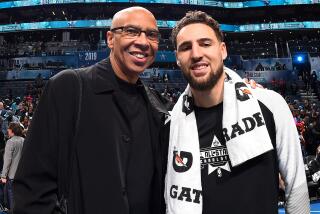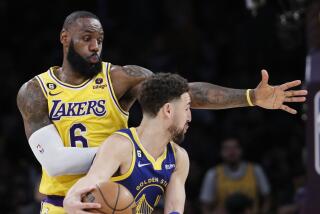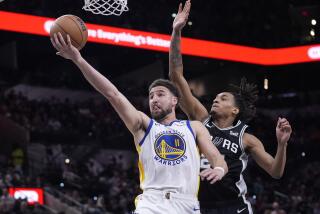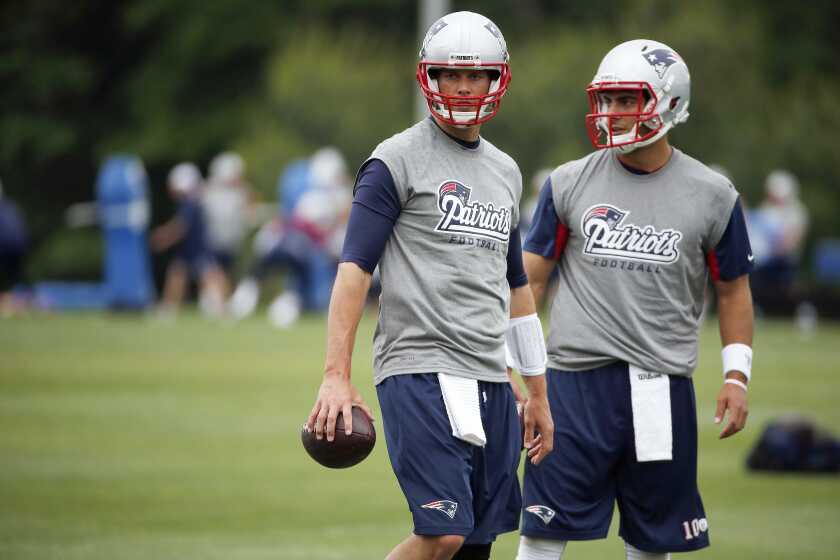Thompson Resigns From Georgetown
John Thompson, the lumbering giant of a coach who draped a towel over his shoulder and built Georgetown’s basketball program into a national power, resigned as the Hoyas’ coach Friday after 27 years, three Final Fours and the 1984 national championship, citing personal reasons he later said include his failed marriage.
A tight circle of friends tried to persuade him not to leave, including Temple Coach John Chaney, who urged a sabbatical instead. Thompson rebuffed them.
“Lending someone your team is like lending someone your toothbrush,” he said.
So the Hoyas--who are struggling this season at 7-6 and 0-4 in the Big East Conference--belong to Craig Esherick now, a former player who has been Thompson’s assistant since 1982. Esherick is expected to sign a long-term contract shortly.
Chaney still recalls the day Thompson was hired to take over Georgetown’s moribund program in 1972, and what it meant to other black coaches.
“I was at Cheyney State at that time, a Division II school, and when I heard John got that job, I was certainly excited, and so were George Raveling and Nolan Richardson,” Chaney said. “We were all extremely hopeful that doors would be opened for so many of us. We did not even take into consideration the icon that he would become.”
A freshman named Patrick Ewing, T-shirts underneath jerseys, Nike’s marketing and Thompson’s own swings between glowering intimidation and a sort of jovial affection helped make him an icon.
So have numbers like 20 NCAA tournament appearances and an overall record of 596-239.
Thompson also coached U.S. teams in the Olympics, guiding the American collegians to a disappointing bronze-medal finish in 1988 and working as an assistant to Dean Smith on the U.S. team that won the gold medal in 1976. Smith still recalls Thompson’s speech before the gold-medal game as “the finest I have ever heard.”
“He was so good for coaching,” Smith said. “No one--and I mean no one--could have made Georgetown a national power better than John Thompson did when he became the head coach. Every team he ever coached played hard and together and did what he wanted them to do.”
Thompson, 57, ruled out health concerns, NBA jobs and Georgetown’s record as reasons he is leaving, and indicated after his news conference the family problems were issues.
Thompson and his wife of 32 years, Gwen, have been separated since a fire damaged their home three years ago, and Thompson filed for divorce in October 1997.
“You know that I am going through a problem with marriage right now,” he said. “And I owe it to my family to address that. Not just to myself and to my wife, I owe it to my family to address that. I would be irresponsible if I did not address that. I can’t deal with that as a distraction.”
Thompson says he is not about numbers. By not trying to make it to 600 victories, he proved it.
There are other numbers that matter.
When Georgetown reached the Final Four in 1982, he was the first black coach to do so. He didn’t want to be patted on the back.
Asked if he was proud to be the first black coach to reach the Final Four, Thompson responded: “I resent the hell out of that question. It implies that I am the first black man to be accomplished enough and intelligent enough to do this. It is an insult to my race. There have been plenty of others who could have gotten here if they had been given the opportunity they deserved.”
When Thompson won the NCAA title in 1984, he was the first to do that as well. Richardson, the Arkansas coach, and Kentucky’s Tubby Smith have since followed.
“From a black coaches’ perspective, he has been to us what Martin Luther King was to his people,” Richardson said. “It’s a shock to everyone in coaching and around the country for such a giant in coaching to step down.”
Thompson also became a vocal opponent of NCAA legislation he believed was unfair to minorities, boycotting two games in 1989 in protest of Proposal 42, which prohibited players who didn’t meet academic eligibility requirements as freshmen from receiving scholarship aid.
“That kind of overt demonstration took courage and conviction,” Chaney said.
In 1994, Thompson was among a group of coaches threatening an organized boycott in protest of reduced scholarships before the Justice Department brokered a deal for dialogue between the coaches and the NCAA.
“Whether you agreed with his stance on the issues, I always respected the fact that he stepped forward and expressed his opinion,” Duke Coach Mike Krzyzewski said. “His opinion opened up a dialogue about issues that maybe would not have been discussed. . . . We need more people like that. He is not afraid to tell you what he thinks.”
(BEGIN TEXT OF INFOBOX / INFOGRAPHIC)
Thompson at Georgetown
*--*
Year W L PCT 1972-73 12 14 .462 1973-74 13 13 .500 1974-75 18 10 .643 1975-76 21 7 .750 1976-77 19 9 .679 1977-78 23 8 .742 1978-79 24 5 .828 1979-80 26 6 .813 1980-81 20 12 .625 1981-82-y 30 7 .811 1982-83 22 10 .688 1983-84-x 34 3 .919 1984-85-y 35 3 .921 1985-86 24 8 .750 1986-87 29 5 .853 1987-88 20 10 .667 1988-89 29 5 .853 1989-90 24 7 .774 1990-91 19 13 .594 1991-92 22 10 .688 1992-93 20 13 .688 1993-94 19 12 .613 1994-95 21 10 .677 1995-96 29 8 .784 1996-97 20 10 .667 1997-98 16 15 .516 1998-99 7 6 .538 Totals 596 239 .713
*--*
x-National champions; y-Final Four
More to Read
Go beyond the scoreboard
Get the latest on L.A.'s teams in the daily Sports Report newsletter.
You may occasionally receive promotional content from the Los Angeles Times.










